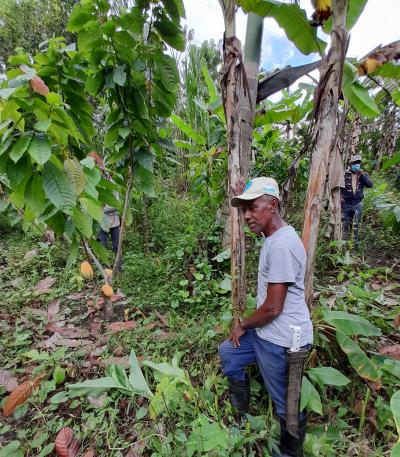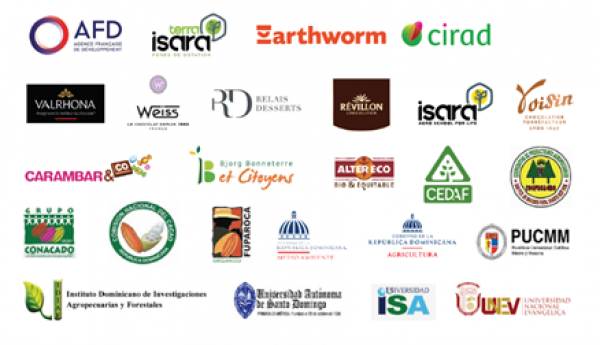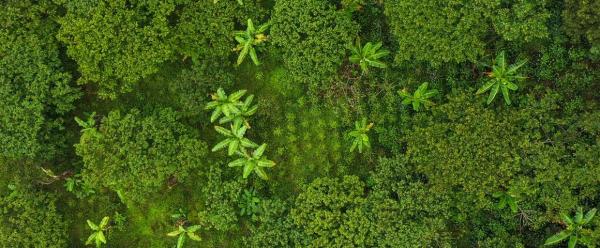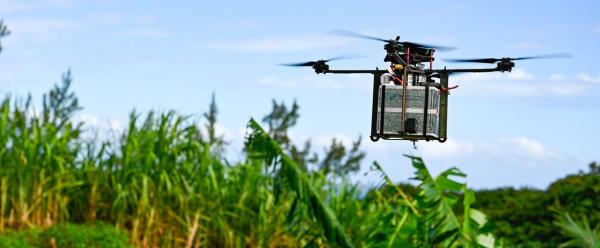Results & impact 10 October 2025
- Home
- Press area
- Press releases
- Sustainable cocoa growing in the Dominican Republic
Cacao Forest: working for sustainable cocoa growing in the Dominican Republic
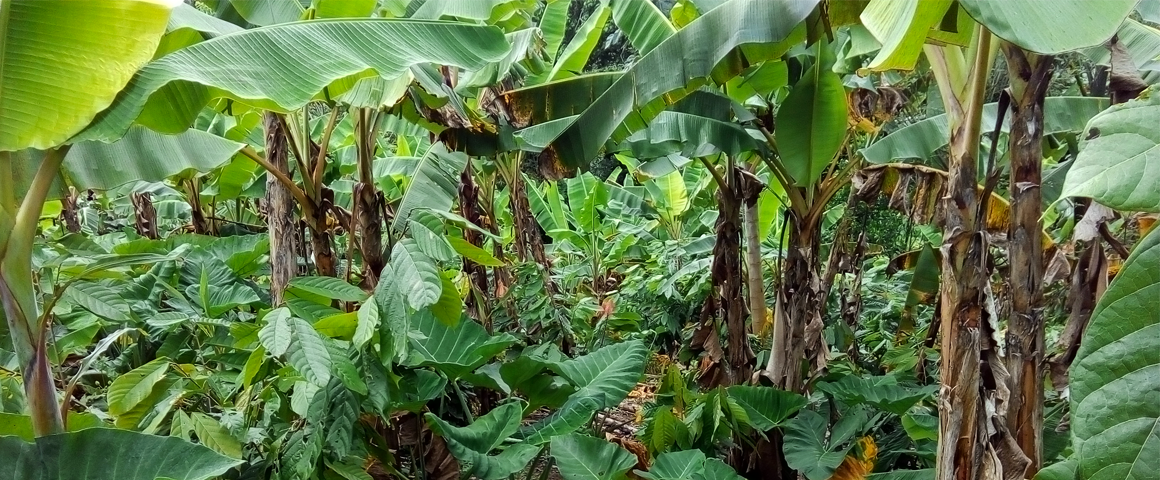
One of the agroforestry models developed as part of the Cacao Forest project (Duarte province, Dominican Republic) © O. Deheuvels, CIRAD
In 2016, Cacao Forest embarked upon a fruitful collaboration with Dominican producers belonging to three cooperatives (CONACADO, COOPROAGRO and FUNDOPO), in partnership with local organizations involved in the cocoa sector, both public (Ministries of Agriculture and of the Environment, IDIAF research centre, UASD) and private (National Cocoa Commission, universities - ISA, UNEV and PUCMM - and FUPAROCA Foundation). The aim was to work together to design sustainable agroforestry models as an alternative to existing systems. The project has targeted more than 1900 producers.
Under the project, four cocoa agroforestry models were designed by Dominican producers and have been tested (as of 2018) on an experimental network of 54 plots set up under actual conditions on 35 smallholdings in three sub-regions. The trial covers an experimental area of 13.5 hectares and has been monitored and assessed daily for more than three years.
The impacts of agroforestry on incomes and biodiversity
The results show that agroforestry has major advantages, such as increased producer incomes (from less than $2000/hectare/year to more than $7000 depending on the models), better cultivated biodiversity management, and more diverse sources of income for the farmers involved.
More than 70 plants grown with cocoa were identified in the Dominican Republic, leading to selection and comparison operations that identified six target high added-value processed products, based on bitter orange blossom, sapodilla, hibiscus flowers, ginger, turmeric, and rocou or annatto.
Producer training was central to the project
Training producers and technicians served to improve the performance of cocoa plantings (in terms of both cocoa and other products), and to make cocoa growing more attractive to family farmers and young people. A short applied cocoa agroforestry course was also built with the Dominican university UNEV.
Processing on a larger scale, and building long-term partnerships
The Cacao Forest worked constantly and closely with local cocoa sector stakeholders to build and validate its cocoa agroforestry models.
"As early as 2022, the quality of the partnerships built enabled our Dominican partners to choose models developed by Cacao Forest for an ambitious national project to rehabilitate 72 000 ha of plantations in the country by means of agroforestry. The project is called PRACAO", says CIRAD agroecologist Olivier Deheuvels, the project's scientific coordinator.
This 12-year project, born from Cacao Forest, will be funded by a loan to the Dominican government from the French development agency AFD. It is now under the umbrella of the Dominican state budget and is due to be officially launched in 2024.
"The new project will allow the rehabilitation of cocoa plantings across the country, based on agroforestry models developed by Cacao Forest, with ongoing reinforcement operations and building solid scientific bases, while focusing on making families more financially resilient", says Sébastian Cardenas, Cacao Forest project coordinator for Earthworm Foundation. It will also enable the Dominican cocoa sector to adapt to the latest standards and regulations, to guarantee responsible, zero-deforestation cocoa production operations for the national and export markets that respects labour law.
Lessons learnt and calls for action
Cacao Forest has highlighted the merits of a holistic, multi-sectoral approach to boost the resilience of the cocoa sector and guarantee responsible cocoa supplies, from a social, economic and environmental point of view.
It has thus paved the way for a new age of sustainability in the cocoa sector. These promising results call for greater investment in research and development to build sustainable farming systems for smallholder communities and cultivated ecosystems.
*Valrhona, Ecotone, Weiss, Révillon, Voisin, Relais Desserts and Carambar & Co
** CIRAD and ISARA
About Earthworm Foundation
Earthworm Foundation is an international non-profit organization that works with businesses, civil society, local communities and governments to reduce the environmental and social impact of supply chains. It works on all five continents to restore forests, regenerate soils and protect communities in production and raw material extraction zones. It helps businesses to design responsible sourcing policies and implement solutions that respect both the environment and people.
About CIRAD
CIRAD is the French agricultural research and international cooperation organization working for the sustainable development of tropical and Mediterranean regions. It works with its partners to build knowledge and solutions for resilient farming systems in a more sustainable, inclusive world. It mobilizes science, innovation and training in order to achieve the Sustainable Development Goals. Its expertise supports the entire range of stakeholders, from producers to public policymakers, to foster biodiversity protection, agroecological transitions, food system sustainability, health (of plants, animals and ecosystems), sustainable development of rural territories, and their resilience to climate change. CIRAD works in some fifty countries on every continent, thanks to the expertise of its 1700 staff members, including 1140 scientists, backed by a global network of some 200 partners. It also supports French scientific diplomacy operations.

























